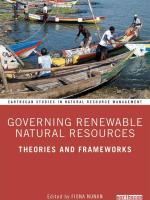Environmental governance at the frontline of the state
Around the world, natural resources and ecosystems are under severe pressure. Understanding how they are governed is essential for developing effective and fair solutions.
The newly published anthology Governing Renewable Natural Resources: Theories and Frameworks introduces readers to a diversity of concepts and approaches that can be used to analyse the governance of natural resources in the context of development.
DIIS researcher Mikkel Funder contributes with a chapter about a key group of actors in the ”everyday governance” of natural resources, namely the government practitioners who implement global agreements and national policies on the ground. While often regarded as insignificant ”cogs in the machinery” of the state, these public servants are in fact important players in shaping how natural resources are governed in practice.
Focusing on the African context, Mikkel Funder discusses how we should understand the rationales, practices and agency of the government staff who work in fields such as agriculture, water, forestry, climate change and community development. He suggests five different entry points to understanding this, namely their:
- role as frontline representatives of the state;
- position in local political dynamics;
- individual perceptions and interests;
- professional and social networks; and
- informal practices and agency.
A key argument is that these often-overlooked factors play an important role in determining how government practitioners go about implementing natural resource policies and programmes, thereby affecting the de facto nature and outcomes of such policies and the way natural resources are governed.
The chapter especially draws on the developing anthropological literature on ”interface bureaucrats”, but links this to related work in public administration studies, organisation studies and development studies. To illustrate the discussion empirically, the chapter draws on research on the everyday implementation of climate policies and projects in Zambia.
DIIS Eksperter

